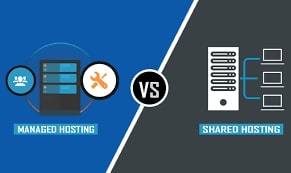Opening a business site? Then, you must keep in mind that the year 2026 is near. What you need to do is ensure everything is in your favor in this regard. Well, you can’t turn a blind eye to proper web development and design. There’s another most important step that comes right after your site is ready for a launch. We’re talking about finding the best server to host your digital storefront. One wrong movement and you’ll see no progress at all. That’s how important this decision is.
There are a dozen options for you. From VPS to shared and dedicated hosting, you can pick any according to your needs and budget. If you look at the main picture, you’ve two more generic solutions: Shared hosting and managed hosting. There, of course, exists a big difference between the two. Shared hosting is, well, just a server that you share with thousands of other hosts. You can opt for the managed choice in the form of VPS, dedicated, or WordPress hosting. There are many factors that you should take into account before finalizing either.
This guide will explain whether you should pick a shared or managed server for your business site in 2026.
Choosing b/w Shared and Managed Hosting in 2026
There are startups that can’t really afford expensive hosting plans like managed WP or VPS. They can kickstart their online visibility by picking shared hosting. Being cost-effective is, undoubtedly, the prime benefit of shared hosting. It, however, might be a good choice for excellent site performance. This is what only a managed plan can guarantee. Reason? All the hosting resources are for a single business site to use.
Below is a comparison of shared and managed hosting for businesses in 2026:
What is Shared Hosting?
It’s a hosting service with just a single server that hosts multiple sites at the same time. This server has the same resources as a managed server. But there’s a difference in how many websites can use them. The shared infrastructure is available to many digital storefronts.
You see, every tenant will have the right to use their share of resources like RAM, ROM, bandwidth, and processing power. It’s as if you get an apartment in a complex. The unit is yours, but resources are for everyone. With shared hosting, most of the maintenance tasks will also be your responsibility.
Benefits of Shared Hosting
You often see people badmouthing shared hosting. It’s not as negative as folks portray it to be. You can just look at the fact that it’s the only option that small businesses with minimal financial resources can use. Other benefits include:
- Ease of use
- Multiple domains hosting
- Essential features
- Built-in security measures
- Necessary support
Then, there are some providers who also offer plans that are scalable. You can also ensure a better uptime for your site in the early stages by buying this plan from a reliable vendor.
Drawbacks of Shared Hosting
You should know that some negative stories associated with shared hosting aren’t just hoaxes. For instance, it does impact your site’s performance. Other drawbacks are:
- Limited scalability
- Weak security measures
- Shared IP address
- Lack of control
- Frequent downtimes
Then, the “unlimited resource availability” claim by many providers is just a misleading marketing claim. No matter what they tell you to win your confidence, you will only be able to use limited bandwidth, CPU, or memory.
What is Managed Hosting?
This is the type of hosting where your provider manages everything related to the server. From technical management to maintenance, you won’t have to do anything on your own. The hosting company will take care of all the matters. This is a professional approach that ensures an optimized infrastructure.
A managed hosting plan provides buyers with a “hands-off experience”. The vendor looks over server setup, routine monitoring, and software updates. They’ll also oversee other tasks like data backups and performance optimization. This is exactly what frees you from all the burden of managing your server.
Benefits of Managed Hosting
When you use a managed server, you can benefit from proactive server management. The provider is quick to resolve any issue before it becomes a headache for you. Other benefits are:
- Excellent website performance
- Guaranteed uptime and reliability
- Automated backups and updates
- Scalability for growth
- Compliance with security regulations
These are the advantages that make managed hosting a preferable choice for many businesses. After all, they can ensure their digital storefronts will keep performing exceptionally.
Drawbacks of Managed Hosting
That said, managed hosting might not be “all good” for some businesses. First of all, it’s not an affordable hosting solution for small-scale businesses. Here are some other disadvantages of this option:
- Limited control over the server
- Dependence on vendor
- Less flexibility
- Less hands-on learning
- Downtime during maintenance
These issues, however, arise only when your hosting provider isn’t trustworthy. Inexperienced vendors don’t have the right skills and experience to offer reliable services. That’s why you should always partner with a trustworthy hosting company.
Visit hostingmena.com if you’re looking for such a trustworthy provider.
Get a Hosting Plan that Your Business Needs
The server you choose to host your digital storefront has a great impact on your website’s success. Whether you want a managed plan or shared hosting, the decision should be in accordance with your budget and your site’s requirements. Get in touch with a reliable hosting provider now to get a hosting plan that your business needs.
For more detail, You can read our related articles: https://regic.net/



